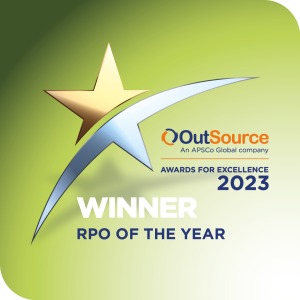Recruitment Process Outsourcing (RPO) is when a company chooses to outsource part or all of its recruitment operations to an external provider, such as Omni. They typically do so in order to reduce costs, access advanced recruitment technology and scale their recruitment as needed. Our guide to RPO will help explain how RPO works and is able to deliver these benefits in 6 simple stages.
A RPO provider can take control of your entire recruitment strategy from end to end, allowing you to focus your time and energy more productively elsewhere. Alternatively, they might focus on a single project or element. As part of the process, they will take on the values and culture of your brand, providing a seamless experience for candidates. Over time, an RPO provider can become a trusted partner.
A Guide To RPO: What You Need To Know
What are the stages of RPO?
1. Sourcing
Following years of experience in the industry, an RPO provider is able to build up an extensive database of information about interesting individuals within the sector. An entry could include information on academic achievements, notable skills and career history as well as any details of previous conversations. This level of data far exceeds that of most company HR departments. Furthermore, RPO providers know how to make the most of social media, whether it be LinkedIn or Facebook. They have the time and expertise to search such sites to find the talent you’re looking for.
2. Screening
One of the most time-consuming aspects of recruitment is screening candidates. This can include fairly general checks to establish the validity of the applicant’s CV and thus whether they are a suitable candidate to take forward to interview, as well as any more specific tests that a company might require. For example, certain industries are legally required to carry out criminal background checks. Candidates may also be asked to complete tests or exercises which assess their level of technical knowledge as well as interpersonal skills. RPO providers can both organise and analysis the results of these activities, providing you with as much insight as possible into an individual before the interview stage.
3. Culture Fit
Aside from examining what they know and what they’ve done before, RPO providers are experts in establishing whether or not a candidate will be a good culture fit for your company. By working with you in partnership over a longer period of time, they become intimately with your brand values, mission statement and team dynamics. A traditional recruiter is unable to gain such insight in the short period of time they work with you.
4. Interview Support
Interviewing can be a stressful prospect. With multiple things competing for your attention, you wouldn’t be alone in feeling under prepared when entering a room to conduct an interview. An RPO provider helps to take the pressure off. They will not only provide you with a detailed brief on the individual but can assist you in crafting questions that get to the heart of what you want to know about a person. From the candidate’s perspective, the RPO provider (looking like your company) will be a reassuring and dedicated presence, ready to answer their questions about the process. If an offer is extended to a candidate, the RPO provider can provide knowledgeable advice during salary or benefit package negotiations.
5. Ongoing Analysis
When it comes to refining your recruitment strategy and internal processes, analysis by a RPO provider can prove invaluable. Part of their role is to ensure that from end-to-end, your recruitment process is as efficient as possible. In order to make recommendations, they will constantly be analysis your cost to hire, time to hire, retention rates and candidate satisfaction.
6. Payment
The fee structure of a RPO agreement will differ to that of a traditional recruitment agency. Most standard recruiters are hired to complete one-off pieces of work, filling a single or small handful of vacancies. As a result, they charge a one-off fee. In contrast, a RPO provider works on an ongoing consultancy basis and charges accordingly, either by the hour or on a monthly retainer.
Click here for further information on our RPO services




